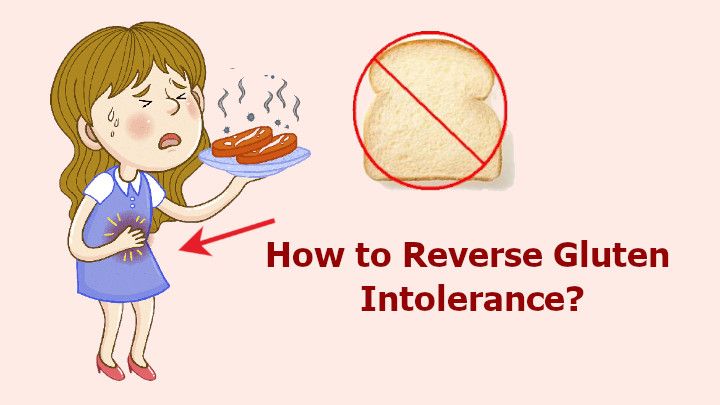How to Reverse Gluten Intolerance? Know The Signs and Symptoms

Did you know how to reverse gluten intolerance? Gluten is a kind of protein primarily found in different types of grain called what, ray, barley, etc., and gluten intolerance is one of the common health issues that trigger numbers of people worldwide.
People commonly make a false impression of gluten or wheat allergy with celiac disease. Most of our food items contain gluten, but allergic people may bother and face health troubles.
Though celiac disease and wheat sensitivity generate almost the same symptoms still there is a vast difference between celiac disease and gluten intolerance.
In This Article
- What is Gluten Intolerance
- How to reverse gluten intolerance
- Signs and Symptoms of Gluten Intolerance
- Celiac Disease vs Gluten intolerance
- Gluten intolerance Foods to Avoid
What is Gluten Intolerance
Gluten sensitivity, also known as gluten intolerance, is a condition in which your body reacts negatively to gluten, a protein present in wheat, rye, and barley grains.
Gluten causes the body’s immune system to attack cells in the small intestine. There is no cure, adopting a gluten-free diet can help to relieve symptoms.
To ensure that your body receives all of the nutrients required to stay healthy, you may need to take specific vitamins and supplements.
Can Gluten intolerance be Reversed
There is no cure for gluten intolerance, but there are some things that may help lessen symptoms.
Some methods that may help to reverse gluten intolerance include:
1. Eliminating gluten from your diet
This is the most direct way to reversing gluten intolerance and can be effective for people who have mild symptoms.
2. Consuming a gluten-free diet
This approach is more difficult to follow and may be more effective for those who have more severe symptoms.
3. Taking supplements
Some supplements, such as chromium, zinc, and glutamine, have been shown to help improve gluten tolerance in some people.
Signs and Symptoms of Gluten Intolerance
Let’s check out 11 signs and symptoms of gluten intolerance and know more important points related to this:-

1. Bloating and Constipation
Bloating and constipation are common troubles and also major signs of gluten intolerance. When you feel fully bloated and heavy in the stomach, that can make you uncomfortable means bloating.
According to one study, 88% of people with wheat allergies reported bloating even after eating small meals.
Constipation is also a sign of gluten intolerance. When your bowel isn’t capable of clearing by itself, or you have less than 3 bowel activities in a week, you have constipation.
2. Sudden Weight Loss
Various researchers explained that sudden weight loss is also a major sign of gluten intolerance. If you are losing excess weight without any prior reason, you must ask an expert for a proper diagnosis.
Wheat allergy and celiac disease both are responsible for that. Moreover, in small children, gluten intolerance cause weight gain
3. Abdominal Pain and Diarrhea
More than 80% of people with gluten intolerance noticed abdominal pain after eating gluten-rich foods as a major sign of that.
People may feel constipation and diarrhea at the same time. Our body reacts with gluten, which causes severe diarrhea. If you notice this without any other cause, you must consult a doctor as it can make you weak and dehydrated.
4. Weak Immunity
If a person with wheat allergy eats a more gluten-rich diet or suffers from celiac disease, the body starts the autoimmune reaction by pointing to the small intestine and making it slow to absorb the needed nutrients.
Even a perfect meal won’t matter or work out well if the intestinal villi have been affected or destroyed.
5. Depression
Depression is also one of the common disorders affecting millions of people, and a study revealed that people with digestive disorders are more prone to depression and anxiety.
According to famous theories, gluten affects the serotonin hormone, also known as the hormone responsible for good mood and happiness, as celiac disease and wheat allergy affect your brain’s neurotransmitters.
The second theory declared that an increased amount of harmful bacteria in the intestine trigger the central nervous system causes anxiety and depression.
6. Joint and Muscle Pain
Numerous causes are available responsible for joint pain and muscle pain, especially in aged people. According to research, the celiac disease produces an over-sensitive nervous system, and excess inflammation in joints results in joint and muscle pain.
7. Fatigue
If you constantly feel tired, it may happen due to your gluten-rich food. Moreover, it can lead to anemia and lack of energy; you may feel fatigued after having such a diet.
8. Skin issues
Dermatitis herpetiformis was the condition when your skin got rashes, and red blisters and people with gluten intolerance may affect by this chronic disease.
The chances increased in people with celiac disease or wheat allergy of rashes and itchiness around knees, buttocks, etc.
9. Hormonal imbalance
Hormonal changes are expected in women, especially during pregnancy and menopause, adding fatigue, anxiety, mood swings, digestive problems, etc. gluten intolerance creates stress to adrenal glands and makes them exhausted.
10. Heartburn
When the stomach acid increases in the esophagus, you feel heartburn, and sometimes it can be painful and make you uncomfortable for a few hours. If you occasionally have heartburn, it can be due to gluten intolerance.
People with wheat allergies cannot absorb the nutrients that make weaken esophagus tissues and lead to heartburn.
11. Headache
If you are sensitive or allergic to gluten, you may feel a severe headache or a migraine and people with gluten intolerance face more headaches than others.
Celiac Disease vs Gluten intolerance
It must be noticeable to everyone to understand the difference between gluten intolerance and celiac disease, as a celiac disease has severe symptoms than gluten intolerance.
Celiac disease is an autoimmune disorder leading to digestive system damage triggering more than 1% of the population. In that case, a small amount of gluten can affect the whole digestive tract and intestine. Celiac disease disturbs the natural nutrients absorbing process, and nowadays, it has been spreading more and more.
Opposite to that, gluten intolerance, said to be an allergy to that protein, causes non-dangerous issues affecting more than 13% of the population and is medically known as NCGS or Non-celiac gluten sensitivity.
Gluten intolerance Foods to Avoid
People with Gluten intolerance need to avoid foods that contain gluten.
1. Gluten-rich Grains
- Wheat
- Ray
- Barely
- Kamut
- Farina
- Triticale
- Wheatberry
2. Bread, wraps, and crackers
- White and whole wheat bread
- Rye bread
- Wheat crackers and wraps
- Bagels
- Flatbread
3. Condiments
- Soy sauce
- Ketchup
- Marinades
- Spicy and gravy mixtures
- Barbeque sauce
- Salad mixtures
There are gluten-free dressings and sauces available to add to the diet.
4. Baking items
- Cakes and biscuits
- Muffins and pastries
- Waffles
- Pancake
- Doughnuts
Many bakeries provide gluten-free bakery products.
5. Pasta
- Wheat or all-purpose flour pasta
- Noodles
- Dumplings
- Spaghetti
- Gnocchi
6. Snack items
- Candy and bars
- Pretzels
- Chips and energy bars
- Cereals
7. Particular Beverages
- Beer and drink mixtures
- Canned coffee
- Chocolate milk
8. Other Products
- Burger and hot dogs
- Processed soups and cheese
- Instant pudding mixes
- Tofu
- French fries
- Ice-creams
- Fried foods
In Closing
Eat more fruits and vegetables in your diet. Nowadays, due to the higher number of people allergic to wheat, you can easily have gluten-free food items that are also delicious without harming your digestive system.
Many restaurants also offer food that has no gluten but checks once before ordering the food from outside.
We hope you would like the information on how to reverse gluten intolerance and if you have any other suggestions, please feel free to share them with us.
References
- “Gluten Associated Medical Problems”– Ncbi
- “Gluten: A Benefit or Harm to the Body”– harvard.edu
- Non-Celiac Gluten Sensitivity: A Review– Researchgate.net





